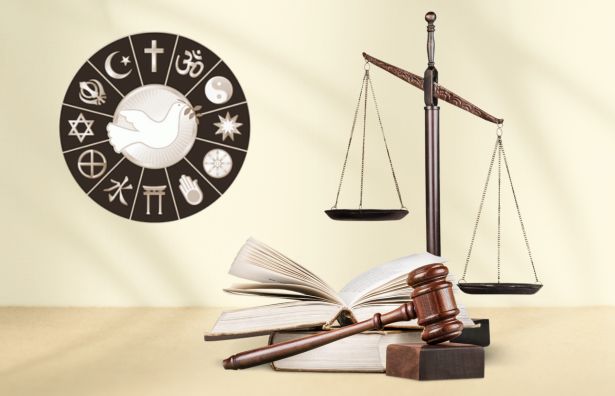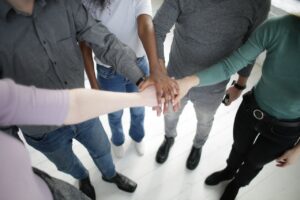Social Justice and Interfaith Activism: Examining the Role of Religious Communities in Promoting Equality
-
by
admin
Introduction It’s no secret that religion plays a vital role in shaping the world around us. Religious communities give people a sense of belonging, guidance, and a moral compass. But how does this play out when it comes to issues of social justice? Are religious communities always on the side of promoting equality? What can these institutions do to help create change? We’ll explore these questions and more below!
Many religious communities have a history of promoting social justice. Religion is a powerful force in society, and many religious communities have a history of promoting social justice. Religious organizations have often been at the forefront of social justice movements, such as those advocating for racial or gender equality. Some scholars argue that these movements were started by religious groups who felt called to fight injustice within society because they believed it was against God’s will (or nature).
However, there are many examples of discrimination and injustice within some religious communities. It is essential to understand that these acts of discrimination can also result from a lack of education about the LGBTQ community and related issues rather than an intention to hurt or discriminate against others. In addition, some religious communities may be unaware that their beliefs or practices contribute to systemic oppression in society at large. Thus, it is imperative for interfaith activists who are working towards social justice for marginalized groups such as LGBTQ people not only to support their efforts but also ensure that they do not inadvertently harm those same marginalized groups through their actions–for example by promoting ideologies which deny certain people’s right to exist (such as conversion therapy).
Many religious leaders, including Martin Luther King Jr, have fought for social justice. Martin Luther King Jr. is one of the most well-known civil rights activists, having delivered his famous “I Have a Dream” speech at the 1963 March on Washington for Jobs and Freedom. He was awarded the Nobel Peace Prize in 1964 and assassinated in 1968.
Religious communities can also act as barriers to social justice. This is especially true regarding LGBTQ rights, which religious leaders and communities often reject. For example, the United Methodist Church has long been known for its opposition to same-sex marriage and the ordination of LGBTQ clergy members (although some congregations have been able to conduct same-sex marriages). The Catholic Church has historically banned priests from conducting same-sex marriages or being openly gay themselves; however, Pope Francis recently stated that he would not judge priests in a relationship with another man–a move seen by many as progress toward greater acceptance within the church hierarchy. Religious groups have also been fighting for social justice causes such as immigration reform and criminal justice reform through lobbying efforts at local levels of government or through national advocacy organizations such as Bend the Arc Jewish Action.
For example, it is not uncommon for religious leaders to stigmatize LGBTQ people
who practice their faith. This can be especially true in communities where there are very few openly LGBTQ members and leaders of religious institutions. In these situations, it is easy for people in power within the community to use their positions to spread misinformation about what being queer means or how one should behave if one identifies as such. However, there are also examples of religious communities advocating for social justice issues like marriage equality and racial equality. For example, many Christian denominations have supported same-sex marriage since its legalisation by the Supreme Court in 2015 because they believe God created everyone equally regardless of race or sexual orientation (see Genesis 1:27).
Religious institutions can be key in advocating for the rights of marginalized individuals and communities through advocacy and activism campaigns.
- Religious institutions have a long history of promoting social justice by supporting legislation protecting oppressed people’s rights. For example, Catholic bishops helped pass an amendment to include people with disabilities in the Americans with Disabilities Act (ADA).
- The National Council of Churches has worked with other religious groups on immigration reform and racial justice since its founding in the 1950s.
One example includes The AME Church’s involvement in the Civil War, where they helped raise money, provided care packages to soldiers serving on the frontlines, and provided spiritual guidance following President Lincoln’s Emancipation Proclamation. The church’s involvement in the Civil War included providing care packages to soldiers fighting on the frontlines and spiritual guidance following President Lincoln’s Emancipation Proclamation. The AME Church also played a crucial role in helping pass an amendment to include people with disabilities in the Americans with Disabilities Act (ADA).
Religious communities play a significant role in shaping individual views about the world around them and their role in changing it for the better or worse. Religious communities can be a source of social justice or a barrier to social justice, depending on how they engage with inequality and oppression. Religious groups may advocate for the rights of marginalized individuals and communities through advocacy and activism campaigns.
Conclusion Social justice is an important issue that affects everyone, regardless of their religious beliefs. Our work as interfaith activists is critical in helping promote equality and fight injustice in our communities. By working with other religious leaders who share similar values, we can achieve more tremendous success in accomplishing our goals than if we worked alone.




